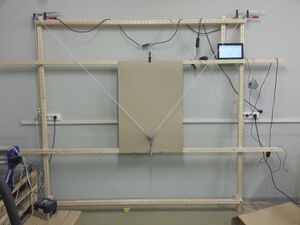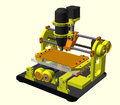CNC routers: Difference between revisions
From
No edit summary |
|||
| (2 intermediate revisions by the same user not shown) | |||
| Line 10: | Line 10: | ||
|parts = [[Frames]], [[Nuts]], [[Bolts]], [[Plates]], [[End caps]] | |parts = [[Frames]], [[Nuts]], [[Bolts]], [[Plates]], [[End caps]] | ||
|techniques = [[Shelf joints]], [[Tri joints]], [[Linear bearing assemblies]] | |techniques = [[Shelf joints]], [[Tri joints]], [[Linear bearing assemblies]] | ||
| | |files = | ||
|git = | |git = | ||
|suppliers = | |||
}} | }} | ||
| Line 52: | Line 53: | ||
* [https://shapeokoenthusiasts.gitbook.io/shapeoko-cnc-a-to-z/ Shapeoko CNC A to Z] | * [https://shapeokoenthusiasts.gitbook.io/shapeoko-cnc-a-to-z/ Shapeoko CNC A to Z] | ||
* [https://threedesign.store/store/ Threedesign: PrintNC] | * [https://threedesign.store/store/ Threedesign: PrintNC] | ||
* [https://openbuildspartstore.com/lead-cnc-machine-1515-60-x-60/ Openbuilds Lead CNC] | |||
Latest revision as of 04:08, 9 October 2021
Project: CNC routers
| Designers: | Timothy Schmidt |
|---|---|
| Tools: | Wrenches |
| Parts: | Frames, Nuts, Bolts, Plates, End caps |
| Techniques: | Shelf joints, Tri joints, Linear bearing assemblies |
Introduction
A computer numerical control (CNC) router is a computer-controlled cutting machine which uses a spindle for cutting various materials, such as wood, composites, aluminium, steel, plastics, glass, and foams. CNC routers can perform the tasks of many carpentry shop machines such as the panel saw, the spindle moulder, and the boring machine. They can also cut joinery such as mortises and tenons.
Challenges
Materials
Approaches
References
- Wikipedia: CNC router
- CNCRouterParts.com_5x10_Pro
- Shapeoko, Shapeoko wiki
- Maslow sub-$500 4x8 CNC router
- Maker Made commercial version of the Maslow CNC
- GRBL UNO R3 Controller Bundle
- Anatomy of a CNC router
- ISO30 vs BT30 ATC Tool Holders - What is the difference?
- Generating CNC router toolpaths from heightmaps
- Rover CNC
- Bulkman3D Queen Bee Pro Upgrade kit
- Shapeoko CNC A to Z
- Threedesign: PrintNC
- Openbuilds Lead CNC




